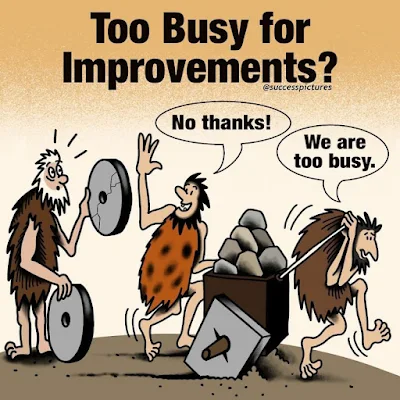We often hear we need to work hard. It reminds me of what I heard back when I was in late elementary, when I hated high school with a passion, and when I actually ended up telling people, "Do you ever wonder why the Philippines doesn't improve?" Of course, if hard work were all there was to it, why are some people stuck in financial difficulty?
Teaching people how not to be too busy to accept improvements
I wrote an article that one should never be too "busy" to accept improvements. We can see that one can work hard without working smart. The two people are introduced to the better round wheel. However, the two aren't thinking that if they had the round wheel, their hard work would pay off better. Changing the wheels from the square tire to the round tire would allow more hard work to be done. How much hard work (that is, delivering rocks) can be accomplished at a faster, more effective rate if they went for the round wheel? Sadly, some people think that hard work will be enough, without thinking about ways to do their hard work smartly.
Improvement of quality of life is not just about working hard. Sure, it's still hard work, even if I've got all the necessary equipment. It's still hard work even if I can accept payments online, or more new technology arrives. However, this hard work can now be made manageable. In working smart, you would think of how to make one's hard work, not just working hard for the sake of working hard.
I prefer to caption this as "Do your hard work, intelligently." I didn't like the illustration of turning the cube into a ball. If a cube is what's required, bring in the cube! What we see here is that other people are still pushing the cube to the destination. These people pushing the cube may only deliver one cube in a day, or the delivery may even be late. However, the person using a forklift to deliver the cubes may deliver several cubes on time. The person may not even have to wake up ridiculously early to deliver the cubes.
What we need to realize is that people need a reasonable business environment. I would be so stupid if I were still having people use typewriters and fax machines, when PCs are going to be more convenient. Typewriters will just eat up more paper compared to if one could edit before one could print. It would be best to buy a UPS for each and every PC. I remember having irritations whenever my PC would reset because I used a regular AVR. The moment I used a UPS, I've had much less worry working. Come fluctuations, I can still save my work before I have to turn the PC off!
This means accepting changes in the market, whether domestic or international. My favorite example is Nokia. I used to have a Nokia phone. However, I soon discovered that smartphones were becoming the norm. It meant even grandpa or grandma (the new generation) can now use a smartphone, with some limited knowledge. Nokia worked hard but failed to work smart. Other companies worked smart by working hard to accept changes. The other companies that worked smart didn't do hard work for the sake of hard work. The other companies that beat Nokia worked hard with their smarts. They worked hard to make sure that their designs would be competitive.
We need to teach financial literacy in middle school and high school
I could blame it on schools. Warren Buffett teaches practical life lessons that I never learned, even in my MBA days! I had to learn stock market investing myself. That's why I have no more interest in getting a PhD. I might not even get the chance to teach students basic investing, like cost averaging on an index fund, using GINvest to invest in the international market, opening an ATRAM account, etc. It's possible to get a college diploma and never learn how to manage one's paycheck. The Christmas rush may just be a symptom of a much bigger problem. That's why I tend to hate the Christmas season. However, it's not Christmas per se that I'm angry about, but the foolishness of people during the Christmas season.
- Teaching about basic accounting principles. This will help people understand basic concepts like the cost of production.
- How to slowly invest in the stock market, or invest in bonds for starters.
- The difference between revenues and profits. This is taught in basic accounting and basic finance.


